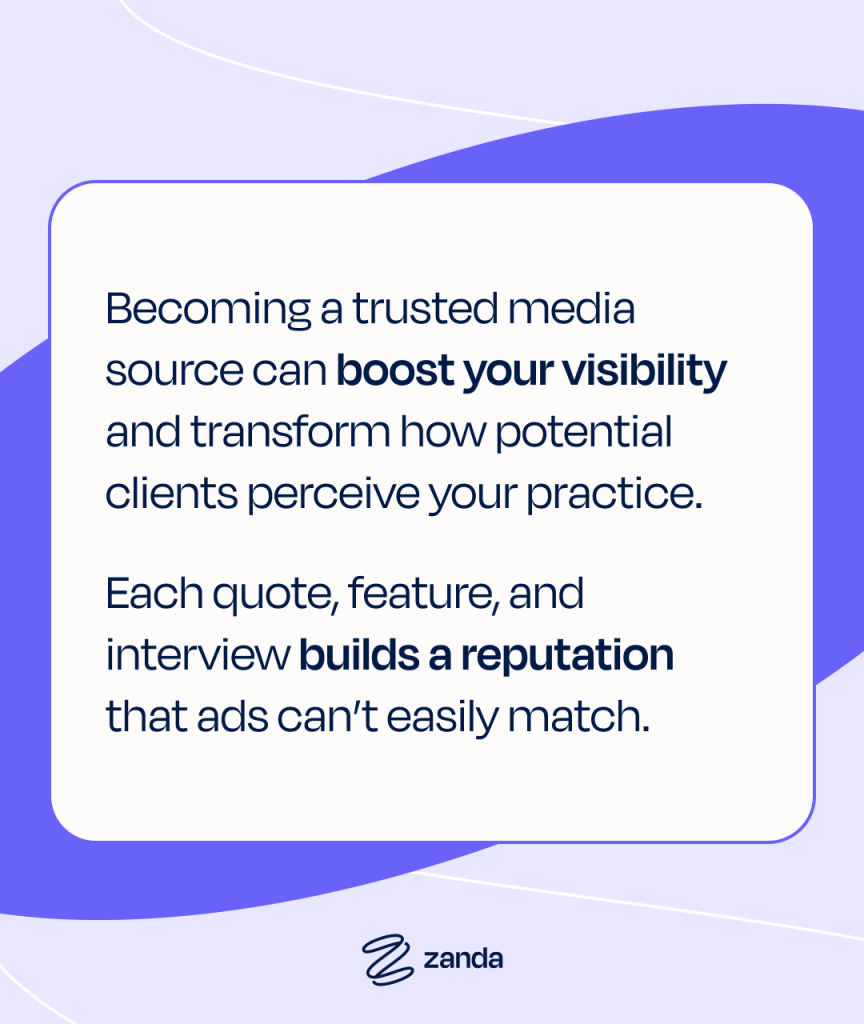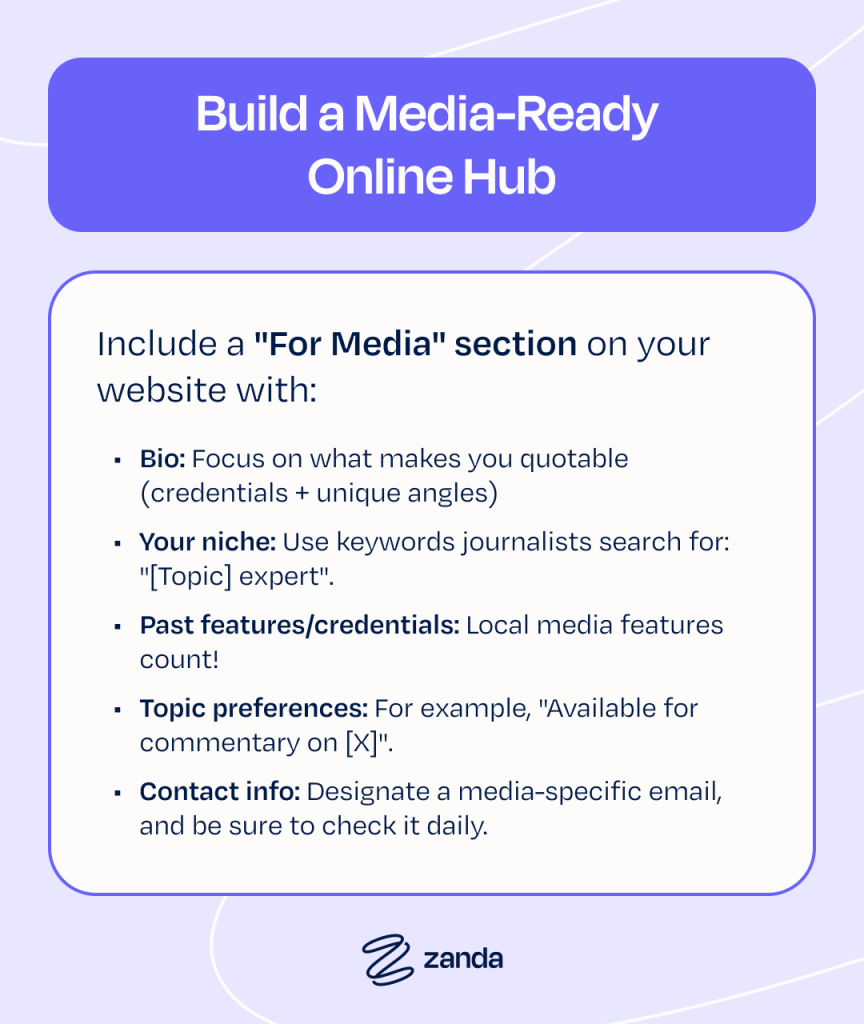Imagine this:
A journalist is writing an article about the rising demand for pediatric speech therapy. They need an expert quote to bring the story to life, someone who understands the challenges parents face and can explain complex concepts in simple terms. They scroll through their contacts, and there you are: the go-to speech therapist they interviewed last year for a similar piece. Your name pops up again, and suddenly, your insights are reaching thousands of readers, all of whom are potential clients.
This isn’t luck. It’s based on strategy.
Earned media – features, quotes, and interviews in trusted publications – boosts your visibility and transforms you from a semi-visible practitioner into a known authority on a topic. Unlike ads or social media, earned media carries a different kind of weight.
But here’s the thing:
Journalists aren’t necessarily looking for the most credentialed expert in the room. They’re looking for the most helpful one. If you can break down industry trends, share real-world examples (and essentially make their job easier), you become a resource.
Of course, the media isn’t the only way to grow your practice, and it’s not for everyone. But if you’ve ever wanted to expand your reach without relying on ads or algorithms, try getting featured on news sites and see the impact it can have on your practice.
Benefits of Being a Media Source
Earned media does what ads can’t: it provides third-party validation of your expertise.
When potential clients see your insights quoted in Psychology Today or your practice featured in a reputable local news outlet, they’re seeing an authority.
The advantages extend far beyond social proof:
Why Media Presence Accelerates Your Practice Growth
Credibility That Converts
Media features serve as powerful trust signals. That “As seen in [Publication]” badge on your website answers the unspoken question every potential client has: “Can I trust this practitioner?”
Enhanced Visibility
A single media mention can have a ripple effect.
Journalists bookmark reliable sources, your quotes get republished across platforms, and suddenly your expertise reaches audiences far beyond your local area, without additional effort on your part.
The Authority Cycle
The more you’re quoted, the more you’re perceived as an expert. The more you’re perceived as an expert, the more media opportunities come your way.
Competitive Differentiation
Media features help you stand out in competitive markets.
When clients compare similar practitioners, those media mentions can become differentiators.
Establishing Your Expertise
Unless you’ve already established a media presence, odds are that journalists won’t find you on their own.
Make it easy for them to see why you’re the perfect source for their story.
1. Own Your Niche
Generic expertise gets overlooked. Specificity gets quoted.
- Go beyond your title: Instead of “psychologist,” lean into your niche. For example, “a psychologist specializing in workplace trauma for first responders.”
- Identify media-friendly angles: What trends, populations, or emerging research can you speak to?
- Pro tip: Keep an “expertise one-pager” with 3-5 bullet points of what you can discuss (e.g., “The impact of telehealth on pediatric OT outcomes”).
2. Build a Media-Ready Online Hub
Your media kit should make a journalist’s job easy.
SEO-optimized bio page
Include a “For Media” section with:
- Bio: Focus on what makes you quotable (credentials + unique angles)
- Your niche: Use keywords journalists search for: “[Topic] expert”.
- Past features/credentials: Local media features count!
- Topic preferences: For example, “Available for commentary on [X]”.
- Contact info: Designate a media-specific email, and be sure to check it daily.
Blog with authority
Publish 1-2 blog articles per month on relevant topics in your field. Feature them on your website and your practice’s social media accounts.
These articles become:
- SEO hooks that make it easier for journalists to find you online.
- Proof of your knowledge when journalists vet you.
- Ready-made talking points for interviews.
Building Media Connections
Journalists need experts like you to bring their stories to life.
When you provide valuable insights, clear explanations, and timely responses, you become the source they’ll remember – the one they’ll rely on again and again.
Here’s how to get started.
1. Find Your Ideal Media Matches
The right connections will amplify your expertise to the people who need to hear it.
Look for:
- Local health reporters who cover community stories.
- Trade publications in your specialty area.
- Media outlets that your ideal client would refer to.
- Websites that will list you as a media source.
- Journalists who’ve written on topics you’re passionate about.
Make contact and let them know you’re happy to assist them with future projects, or provide your own idea for a story. Keep the focus on being helpful, and the opportunities to promote your practice will follow!
Pro Tip: Set up Google Alerts for terms relevant to your practice to spot fresh opportunities.
2. Become a Go-To Expert
Journalists remember sources who:
- Respond quickly, even just to say, “This isn’t my area, but here’s someone you can try…”
- Explain complex topics in simple, quotable soundbites.
- Provide insights that add depth to their stories.
3. Smart Media Partnerships
While most journalists want to inform rather than sensationalize, it pays to be selective.
Just as good journalists should verify the credibility of their sources, it’s wise for you to do some due diligence on the journalist you may be working with.
Before engaging:
- Review their past work: Are they typically supportive of experts, or do they tend to sow controversy? Avoid journalists who write “gotcha” articles or anything that would take down someone else.
- Trust your gut: If an interview request feels misaligned with your values, it’s okay to pass on it. You may even find that the interview topic changes after you accept – if it’s something you don’t want to comment on, don’t give it fuel. Politely decline and look for the next opportunity.
- Protect your reputation: Your credibility is your currency – remember to stay disciplined in your speech, and assume that everything you say is going to be quoted. If you say something you think is off the record, the journalist may not be able to resist the temptation to include it.
This isn’t about avoiding tough questions, it’s about engaging with the right opportunities and maintaining your professional reputation.
4. The Name Game
Ideally, you want to get your name, profession, and business name mentioned in the story.
While you shouldn’t demand promotional links, you can:
- Naturally, mention your practice when relevant (“In my work with postpartum clients at [Practice Name], we see…”).
- Offer a media kit post-interview with your official bio and headshots.
- Follow up with a thank-you email including your website link.
Journalists will usually include your practice name in an article, but even if they don’t, people will search for you online.
5. Amplify Every Media Win
Transform coverage into credibility-building assets:
- Website showcase: Create an “As Featured In” section with logos of news outlets.
- Social proof: Share quotes from features in newsletters and waiting room materials.
- Repurpose content: Mention your media features in newsletters and social bios.
Pro Tip: When sharing features online, always tag the journalist and outlet – it strengthens relationships and often leads to resharing.
From Media Mentions to Meaningful Growth
Becoming a trusted media source can boost your visibility and transform how potential clients perceive your practice. Each quote, feature, and interview builds a reputation that ads can’t easily match.
When those new clients come knocking–whether from a newspaper article, a podcast mention, or a TV segment – your practice needs to be ready to welcome them.
With tools like online booking, automated intake forms, and Mailchimp integration to keep your community engaged, Zanda helps you focus on what you do best – providing exceptional care (without burning out).
Experience Zanda – Try It Free Today. No credit card required.







